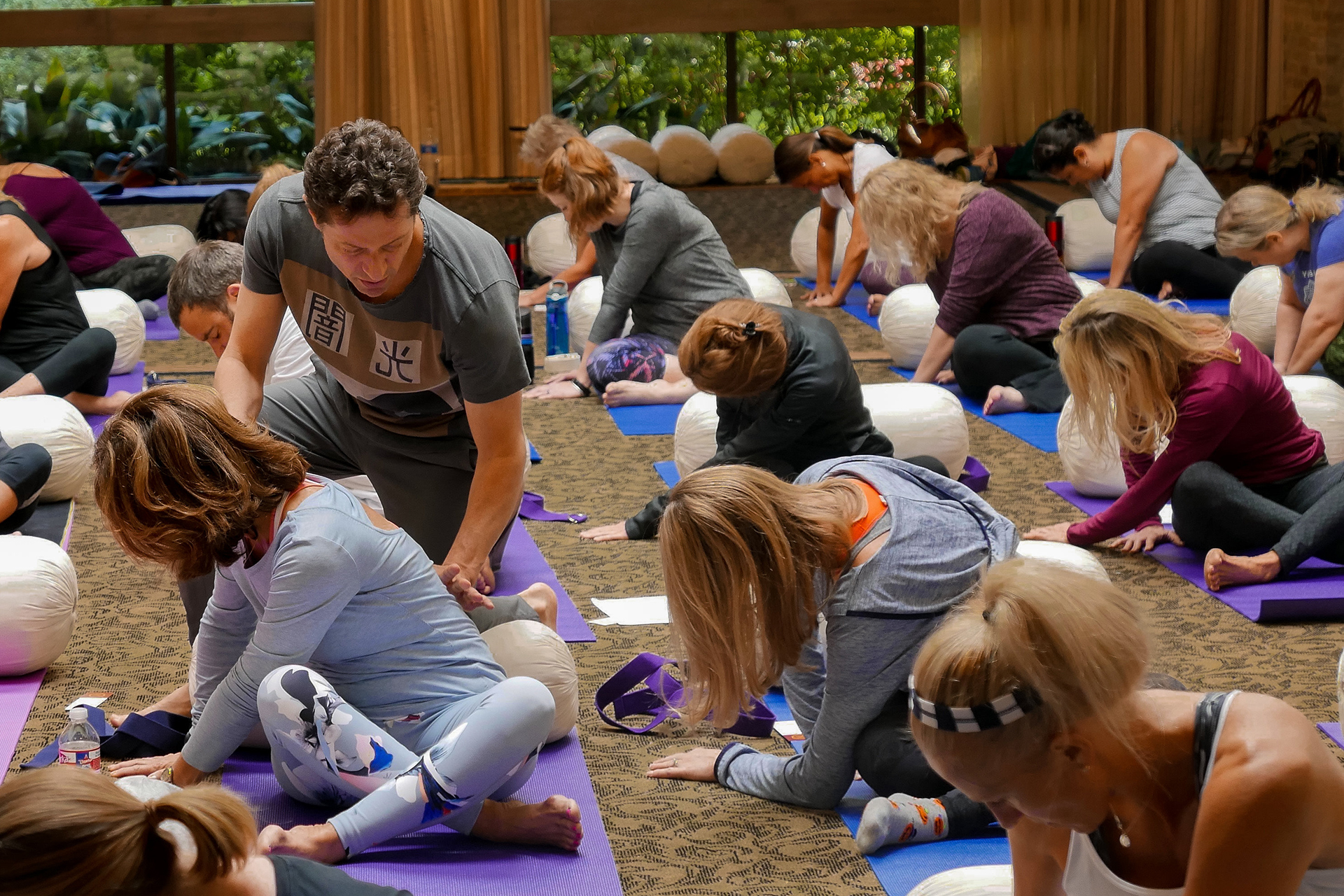Has An Injury, Trauma, Illness Or Stress Impacted Your Mental, Emotional And Physical Wellbeing?
“Yoga has been practiced in the East for thousands of years, and its adepts have claimed numerous benefits: physical, emotional, and spiritual. Until recently, however, these effects have not been quantified scientifically. With Bessel van der Kolk’s compelling research on the efficacy and positive physiological effects of yoga in trauma recovery, a vital new application for this ageless health-promoting method has been revealed.”
– Dr. Peter Levine, Foreword, Overcoming Trauma Through Yoga (2011).
Are you struggling with the aftereffects of trauma, feeling depressed, anxious, isolated or on edge? Is unresolved physical, mental, emotional or developmental trauma manifesting through autoimmune issues, digestive problems, pain, fibromyalgia or a change in eating or sleeping patterns, to name just a few? Maybe you’re an athlete with an injury and lack of full mobility, pain and an inability to train and engage in the activities you love are causing you ongoing distress. Or perhaps you are trying to manage chronic pain, chronic fatigue or stiffness, feeling angry and trapped in your body. Doctors and other practitioners may have suggested yoga for healing, but you may fear that you lack the strength, flexibility and coordination to try it on your own or in a class filled with seasoned yogis. It might be that relationships, maintaining focus and everyday tasks seem harder for you than for others, and you feel helpless, hopeless and overwhelmed. Do you wish you could find a way to heal, integrate your body and mind and move forward feeling physically, mentally and emotionally well?
Living with the aftereffects of any kind of trauma can be a painful, stressful and depleting experience. Although you want to feel supported by and connected to the people you love, there may be some days when you feel fatigued, irritable or even numb and just want to be alone. You might have tried different approaches to healing—from traditional therapy and counseling to physical therapy and chiropractors to various forms of energy work—but nothing has led to any kind of sustainable relief. Perhaps you’ve heard that yoga can help, and even tried a class or two, but don’t know what you’re doing and feel alone in the practice. Or maybe you have a dedicated yoga practice and want to learn more about yoga as a form of trauma therapy. Essentially, do you want to feel confident and healthy in your body, balanced in your mind and capable of managing the challenges and stress that are an inevitable part of life?
Understanding Trauma
Simply defined, trauma is caused through an event or series of events that are perceived as threatening and put the body into survival mode, which is often experienced through fight or flight. Sometimes, however, we are in a situation in which we cannot use this excess energy to fight or flee and, instead, freeze.
Immobilized by fear, we become much like a possum under predatory threat. Unlike the possum, however, which shakes violently to release this survival energy once danger has passed, most humans do not know that they should or feel like they can’t move or shake once the threat is over. The result is that this excess energy—trauma—gets trapped in the nervous system and can, and usually will, impact all aspects of our lives until its renegotiated, resolved and released through the body. Until properly resolved, trauma can create ongoing physical issues, as well as impact us mentally, emotionally and socially. Trauma can affect our ability to trust, feel safe, calm and function effectively.
Trauma is also prevalent in today’s world. You may have experienced developmental trauma through ongoing abuse or neglect as a child or in an abusive relationship as an adult. Or, you may have experienced a single incident trauma caused through a car accident, invasive surgery or an assault. Or, even still, you may have experienced physical trauma though aggressive training, a performance injury or a cycling accident, which are common here in Boulder—a hub for athletes—that’s impacting all aspects of your wellbeing
Since trauma lives in the body, it needs to be resolved though the body. The good news is that yoga—especially the trauma sensitive practice of Kaiut Yoga—can help you heal regardless of the cause or severity of your experience and trauma symptoms. As a trained Kaiut Yoga teacher, certified Somatic Experiencing practitioner and consultant, Medical Qigong practitioner, facilitator of Feeding Your Demons and practicing Buddhist and psychotherapist who has been treating trauma for more than a decade, I can help you integrate mind and body in a way that helps you find freedom from pain.
Kaiut Yoga Therapy Provides You With Support, Safety, Skills And Relief
Everyone experiences and heals from trauma differently. Although, for most people, the healing of trauma comes through working with a skilled, experienced trauma therapist in a trusting relationship. All nervous systems, bodies, needs and therapy goals are different as well, which is why I will develop a yoga trauma therapy strategy or sequence that is custom designed and works specifically for you.
My trauma informed yoga approach integrates Kaiut Yoga with other effective, evidence-based approaches to healing trauma, such as Somatic Experiencing and Mindfulness. Kaiut Yoga, created by Francisco Kaiut, is a form of yoga that is specifically designed to work with trauma; accessible for all bodies and all nervous systems, regardless of age, body type or level of fitness; and focuses on biochemical health and freedom of movement. Kaiut Yoga was designed to help people work through chronic pain, new and reoccurring injuries, general aches and stiffness and stems from focusing on the joints rather than extreme stretching of the muscles.
Designed to help practitioners maintain or return to optimal body functionality, Kaiut Yoga promotes freedom of movement and energy flow, and through the poses, you’re encouraged to mindfully notice how you react mentally, emotionally and physically to your experience. As Francisco often says, with freedom of body, comes freedom of mind and leads to a better quality of life.
Kaiut Yoga is not about pushing yourself into uncomfortable poses, up-leveling the practice or achieving perfect asanas. Rather, this practice can be used therapeutically to help you tap into and heal your body through simple motions. In our initial session, I’ll access your nervous system and its current capacity. This process helps me determine which poses can help to safely open your nervous system, heal and strengthen your body and resolve trauma. Kaiut Yoga therapy sessions are supportive and we’ll move at a pace and through poses that are comfortable for you. And, with your permission, I can also use supportive touch to support your nervous system and create feelings of safety. This form of relational movement can help you develop an increased capacity to trust your body, others and your whole self, which is often a key aspect of healing trauma.
After doing Kaiut Yoga therapy, once client said, “I can see better, hear better and my speaking voice is unstrained. A weight has been lifted off of me. It makes daily tasks so much less daunting knowing I won’t be in pain, or won’t be feeling frustration, knowing my body is functioning properly. Suddenly the weight of all the anxieties is so much easier to deal with when my body is feeling correct.”
This highly integrative approach to trauma therapy is based on your needs and therapy goals. Through safe, supportive trauma counseling sessions and guided yoga poses, it is possible to feel freedom within your body. As you experience relief from physical pain, you can more easily cultivate an open and calm state of mind and strengthen your mind-body connection. And, through increasing tolerance, resiliency and personal awareness, it is possible to resolve trauma, relate to your body with loving kindness and engage the world with increased openness, curiosity and joy.
You still may have questions or concerns about yoga trauma therapy…
I feel trapped in my body and have a lot of pain. The idea of yoga scares me.
My approach to yoga therapy is slow, can be gentle and is based on what you need. I invite you to come in for a session. We can talk through your pain and I can access your nervous system. From there, I can slowly guide you through very gentle poses and a simple sequence designed specifically for you and your body.
How long does Kaiut Yoga therapy generally take?
The length of time spent in any kind of trauma therapy really depends on you and your specific experience with trauma, needs and goals. However, this form of yoga therapy can be enjoyed as an ongoing practice And, I believe that you will want to continue with it. Like any other supportive, healing practice, when done regularly, Kaiut Yoga therapy can help you continue to open up, make personal, physical and even spiritual discoveries, cultivate awareness and increase your capacity to heal and grow. And, as we age or experience injury, this is a wonderful practice to keep our bodies and minds as healthy as possible.
I’m not traumatized. I’m just getting older and in physical discomfort. Can this type of somatic therapy still help me?
You don’t have to be dealing with either trauma symptoms or acute pain to experience the benefits of this work. This supportive, integrative form of therapeutic yoga can help any one of any age feel more open, curious and alive in their body. It can also mitigate stress, promote calmness and help you feel more freedom and connection in all aspects of your life.
You Can Feel Healthy And Whole—Mind And Body
If you’re struggling with trauma, want to feel more alive in your body and/or are looking to expand your mental, emotional and physical wellbeing through a guided, trauma sensitive yoga practice, I can help. Please call me at 303-489-8432 to schedule a free 30-minute phone consultation. I’m happy to discuss your experience with trauma, needs and goals and answer any questions you have about Kaiut Yoga therapy and my practice.






